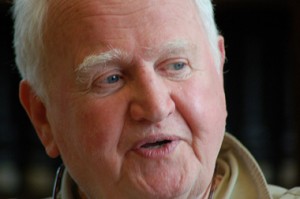Actor, writer, raconteur, dishwasher, radio host, longshoreman, Green Party candidate for governor of New York—Malachy McCourt is, or has been, all of those things.
Add another title to McCourt’s resume: distinguished scholar.
Wednesday afternoon found McCourt waxing Socratic in the Henry Library at Chestnut Hill Academy. Earlier in the day, he had read Shakespeare, coached a drama practice, and spoken on the role of the Irish in U.S. history. But now, as the last bell rang, McCourt found himself at the center of a long wooden table—and the center of attention—at a gathering of the Upper School’s Multicultural Student Association.
Probably the most dominating feature of the room is an imposing Calder fireplace, with a bit of timely advice from Isaiah—“Kyndle Yr. Awne ffire—carved in stone over the hearth. Obligingly, McCourt was setting off sparks of his own.
For just under an hour, McCourt led a freewheeling discussion about everything from shock jock Don Imus’s brutish racial slur—“Does that solve the problem, somebody getting fired?”—to the proper uses (if there are any) of a particular profanity. (It sounds like poetry when he uses it.)
He seemed most delighted whenever one of the boys begged to differ with him, whether on the issue of rap music lyrics or gay marriage. He’d lean back in his chair and unleash one of his playful, gap-toothed grins, and those thick, frost-white eyebrows would twitch with unalloyed delight.
McCourt’s day at CHA came courtesy of the school’s Steele Guest Faculty program. The program was the brainchild of the late Franklin Steele, himself a man of many interests and pursuits—a lawyer by education, followed by 15 years on Wall Street and still more years after that as an investment management consultant. Steele also is remembered as an ardent collector of baseball memorabilia, and the publisher—with his wife Peggy and artist Dick Perez—of some of the finest baseball art in the world.
The purpose of the Steele Guest Faculty program is to increase awareness and understanding of the Celts’ unique contributions to the world.
“Frank very much identified with his Irish heritage,” explained Peggy Steele, who had spent the day shadowing McCourt. “His (Steele’s) grandfather was an Irish gypsy, or tinker. In fact, when Frank and I went to Ireland, he used to hang out with the tinkers.”
Peggy launched the program in 2000, shortly after her husband’s death. The program went to CHA because the Steeles had a grandson at CHA and Peggy serves on the board. “This was something he and I had talked about,” Peggy said. “He knew that there was a time when the Irish were not favorably looked upon. He said it was important that young people be exposed to current Irish culture.”
McCourt follows in the footsteps of several other distinguished guest faculty members, including Mick Moloney and Eamon Grennan. Peggy Steele contacted McCourt, who was the friend of a friend. “Malachy thought it was a great idea,” she said.
As he took a bit of a breather before the arrival of the multicultural student group, McCourt had time to reflect on the day and its meaning. He recalled with delight the students’ many questions about the roles and contributions of the Irish on both sides of the Civil War conflict. And he reveled in his brief classroom appearance that morning as the character Mercutio from “Romeo and Juliet.”
As for what an Irishman is doing teaching Shakespeare, McCourt had a ready explanation. “I love the language,” he said. ”I don’t think you could ever use too many words. You know that the Irish will never use one word when a hundred will do.”
All in all, not a bad gig for a man who describes his academic career as “very undistinguished.” Indeed, McCourt’s brief bio on IMDb.com notes that he “managed to fail every subject in school except English and recess.”
The irony of the situation wasn’t exactly lost on him. “They haven’t gotten wise to me yet,” he smiled conspiratorially. “If I stay much longer, they will.”
The CHA community looked like it was in no rush to see him leave, however. The students and faculty were clearly enjoying the contributions and insights of their faculty member for the day. As one enthusiastic Middle School student put it, “he was funny and talked about important things in a way we could understand.”
On a semi-serious note—with Malachy McCourt, it seems to be a well-worn note—he admitted that “It’s very odd to become considered an academic.” At the same time, he said, “I don’t mind sharing what I have. I have opinions about everything.”

